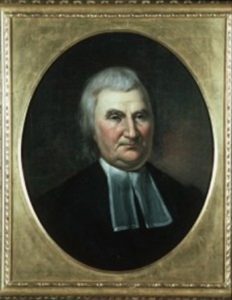
John Witherspoon
*John Witherspoon was born on this date in 1723. He was a white-Scottish American slave owner, a Presbyterian minister, and a Founding Father of the United States.
John Witherspoon was born in Beith, North Ayrshire, Scotland, as the eldest child of the Reverend James Alexander Witherspoon and Anne Walker, a descendant of John Welsh of Ayr. He attended the Haddington Grammar School and obtained a Master of Arts from the University of Edinburgh in 1739. He remained at the university to study divinity. In 1764, the University of St. Andrews awarded him an honorary doctoral degree in divinity. Witherspoon was a staunch Protestant, nationalist, and supporter of republicanism. Following the Jacobite victory at the Battle of Falkirk (1746), he was briefly imprisoned at Doune Castle, affecting his long-term health.
He became a Church of Scotland (Presbyterian) minister at Beith, Ayrshire (1745–1758), where he married Elizabeth Montgomery of Craighouse. He and his wife had ten children, only five of whom survived to accompany their parents to America. After coming to America, Witherspoon owned slaves and lectured against the abolition of slavery. From 1758 to 1768, he was minister of the Laigh Kirk, Paisley (Low Kirk). Witherspoon became prominent within the Church as an Evangelical opponent of the Moderate Party. During his two pastorates, he wrote three well-known works on theology, notably the satire "Ecclesiastical Characteristics" (1753), which opposed the philosophical influence of Francis Hutcheson.
Witherspoon embraced the concepts of Scottish common-sense realism and, president of the College of New Jersey (1768–1794; now Princeton University), became an influential figure in developing the United States' national character. Politically active, Witherspoon was a delegate from New Jersey to the Second Continental Congress and a signatory to the Declaration of Independence on July 4, 1776. He was the only active clergyman and college president to sign the Declaration. Later, he signed the Articles of Confederation and supported the ratification of the Constitution. In 1789, he was convening moderator of the First General Assembly of the Presbyterian Church in the United States of America.
According to Herbert Hovenkamp, Witherspoon’s most lasting contribution was the initiation of Scottish common-sense realism, which he learned from reading Thomas Reid and two of his expounders, Dugald Stewart and James Beattie. At Princeton, he revised the moral philosophy curriculum, strengthened the college's commitment to natural philosophy, and positioned Princeton in the larger transatlantic world of the republic of letters. Witherspoon suffered eye injuries and was blind by 1792. He died on November 15, 1794, on his farm Tusculum, just outside Princeton, and is buried along Presidents Row in Princeton Cemetery. An inventory of Witherspoon's possessions at his death included "two slaves ... valued at a hundred dollars each".